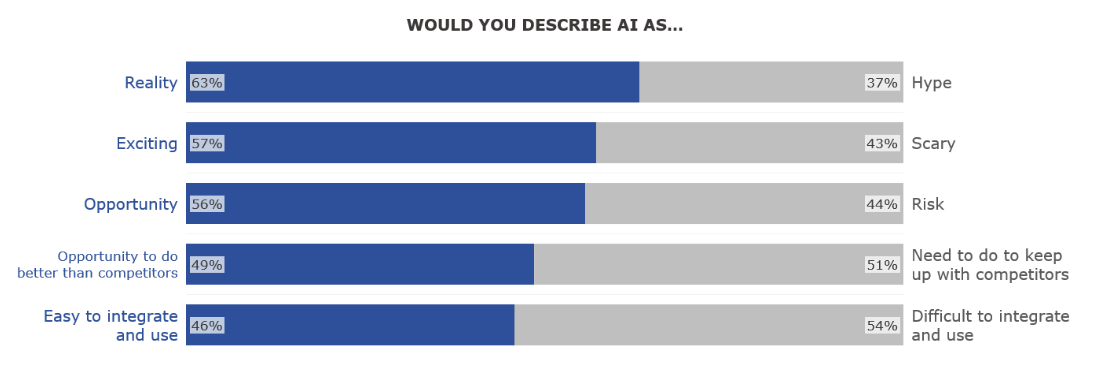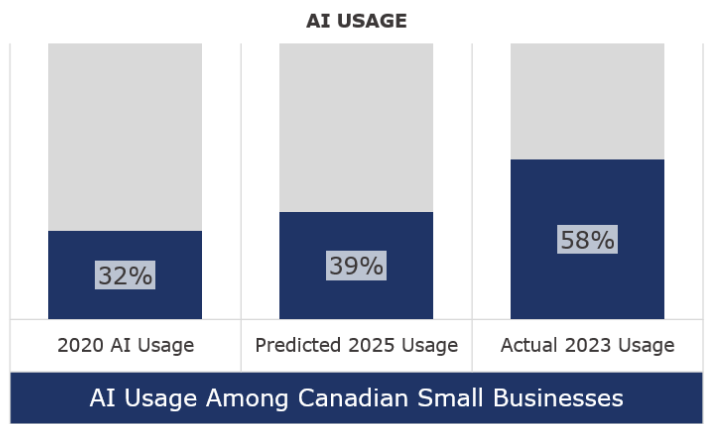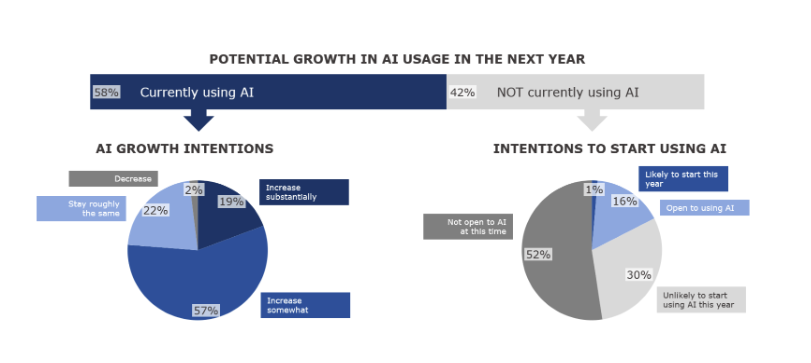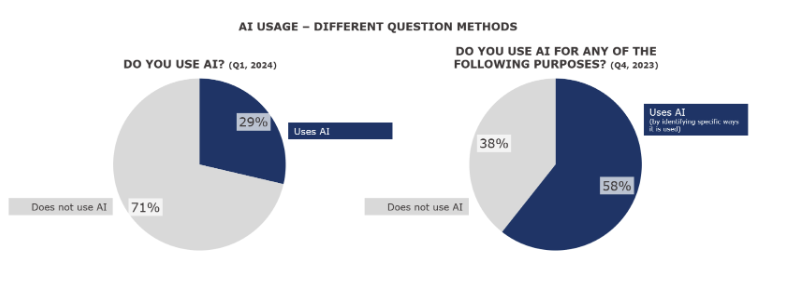Brief • 2 min Read

For small business owners, every decision matters and every minute counts; they have tons of work to do, fewer hands to help, and the same 24 hours in every day. So with the potential power of AI to help – or to completely do – certain key tasks for businesses, it is not surprising that Canadian business leaders have had their eyes on AI for quite some time. However over the past several years, AI has gone from a trend being watched to a tool being utilized for a large number of Canadian small businesses.
(Findings are from the previous two waves of Maru’s quarterly BizPulse study, fielded in January and April, 2024. “Small business” is defined as having fewer than 100 employees.)
As AI usage increases both among consumers and businesses, most small business leaders have come to understand that AI is here to stay, and is something they will have to understand and use in order to keep up. However, they continue to show a healthy mix of excitement and cautiousness when it comes to the prospect of integrating AI into their business. Small business users see AI as being very much a mix between opportunity and risk, and between exciting and scary.

AI Usage Has Grown Substantially, Is No Longer Just For Large Businesses
In 2020 when we first asked about AI usage, just 32% of Canadian small business leaders reported using AI for any reason. At that time, while users were happy with the impact AI was having on their business, the vast majority of non-users reported having no interest in starting to use AI; in fact, just 10% of non-AI users in 2020 reported they thought they would begin using AI in the next five years, while 63% said they would “never” use AI. Fast forward just three years, and we see a very different picture than the one predicted by small business leaders; AI usage among Canadian small businesses has nearly doubled (from 32% in 2020 to 58% in late 2023), and most AI users (76%) say their AI usage will continue to increase over the next year.

Small Businesses Are Using AI for a Variety of Purposes
Among the nearly six-in-ten Canadian small businesses that are using AI, a wide variety of use-cases are identified where AI is being put to work. These tasks span from simpler executions such as data analysis and writing emails, to more complex executions such as helping with product design and innovation. The top ten use-cases for AI among Canadian small businesses are:
- Reducing repetitive, mundane tasks
- Writing at least some of our communications
- Innovating our products and services
- Improving sales and marketing decisions
- Data collection and analysis
- Streamlining hiring and onboarding processes
- AI-enabled quality control/assurance
- Product/service design
- Smarter email marketing
- Helping with bookkeeping and accounting
Over the past three years, the top five areas where AI usage has grown among small businesses are:
- Streamlining hiring and onboarding processes
- Automating customer service (e.g., chatbots)
- Reducing repetitive, mundane tasks
- Helping make inventory and purchasing decisions
- Making our back-end organization more efficient
Those Using AI Say It Has Been Helpful, and Intend To Use It More in the Future
Seven-in-ten small business leaders using AI (71%) say it has been helpful, including one-in-five (22%) who say it has been “hugely helpful” for their business. With so many users saying AI has been helpful, it is no surprise that three-quarters (76%) of small businesses using AI say they plan to increase their AI use over the next year, while just 2% say they plan to decrease their AI usage.
However there is also a trend showing that the value of AI has not yet become clear to non-users, and that most who have a willingness to try AI have already done so; just 1% of non-users say they are likely to start using AI in the next year, while 52% say they are not open to using AI at this time.

AI Usage Among Small Businesses Is Higher Than Most Estimates
One interesting finding from our research suggests that many small businesses leaders may not think of themselves as “AI users”, even though they actually are using AI in one or more ways. This finding came to light over several waves of our study, in which we asked about AI usage in two distinct ways. Firstly when asked with a simple yes/no question whether they use AI (in our Q1 2024 wave), just 29% say “yes”, indicating the majority of Canadian small businesses do not think of themselves as AI users. However when prompted with a list of use-cases (Q4 2023), 58% pinpoint at least one way that their business uses AI. This would suggest that many AI implementations are becoming second-nature, and may not be overtly even though of as being “AI”.

Conclusion
AI growth among Canadian small businesses has hugely outpaced the growth rate predicted by small business leaders just three years ago, underlining how far this technology has come in a short period of time. While Canadian business leaders seem open to further embracing the role AI can play in their business, they remain somewhat cautious about its implementation. Despite this caution, we are likely to see significant growth in the coming years in the number of companies using AI, and the breadth of ways they are using it.
Subscribe for more Insights
Subscribe to our newsletter for the latest trends in business, politics, culture, and more.
Subscribe for more Insights
Subscribe to our newsletter for the latest trends in business, politics, culture, and more.
Related Content








